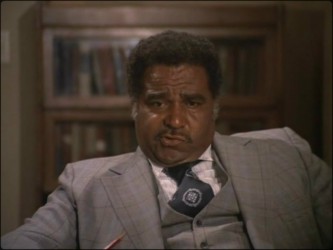
Angry Black Chief: Captain Harold Dobey. Aggrieved. Frustrated. Forever on the verge of a nervous breakdown. What the hell is going on over there? Hell yes I’ve got a case for you. Yes, another one! A scowl for the world, but a candy center when it counts. But he’s still angry as hell. And black. And he was there first. As played by Bernie Hamilton, he’s both a trend-setter and a tide-bucker. A man just on the edge of fat, without the expected jolliness to match. Whether in person or on the phone, he’s had it. Up to here, if you have to ask.
A home life? He’ll both turn out the lights when he leaves and start the coffee when he arrives. He’d sleep, but he has a city to save. No real family to speak of (they’re mentioned once, but only to target for murder), no real love, no hope of escape. Just a job to do and a healthy appetite to mask the pain. Some days, it’s all he can do to avoid shooting Starsky and Hutch his own damn self. But when one takes a bullet, he’ll be there. A grim facade to fight back the tears. Just don’t ask him to find any more money in an already tight budget.
Botulism: Name another show that has dealt with botulism. Go on, I dare you. Okay, maybe House. But unlike that claptrap of dubious realism, this shit nearly takes out a hero. Having singlehandedly reduced the greater LA crime rate in the course of a few seasons, Starsky and Hutch decide to take a break. It’s time for a game, and what signals sexy maturity better than hide and go seek? Okay Starsky, so you think you know your blond buddy? Where he shops, eats, and might run in a pinch? Willing to risk two weeks’ pay on it? You have 48 hours to find him.
Only first, he simply must eat an uncooked helping of clam chowder. Straight out of the can! The very brand killing millions across the globe with a damn-near untreatable toxin. Not sure, eh? We’ll play a news alert just in case you didn’t catch it. Close-up on the empty can in Hutch’s backseat to seal the deal. But Hutch ain’t playing fair. He’s hiding out in a flophouse, complete with more disguises than a circus troupe. One happens to remind us of Jon Voight in Runaway Train. Starsky even fakes his own shooting to pull Hutch out of hiding and into a hospital. And yet, all the sweating, swaying, and moaning in the world won’t get Mr. Soul an Emmy.
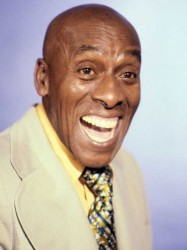
Cameos: Jesus Horatio Christ, who wasn’t on this show? I’d list them all, but you have other things to do. I don’t, however. For starters, there were seven actors who later appeared on Three’s Company alone! John Ritter, Norman Fell, Suzanne Somers (three times!), Priscilla Barnes, Jeffrey Tambor, Fran Ryan, and that dude who played the stuck-up food critic who Jack thought gave him a bad review, only he didn’t, so Jack snuck into the guy’s office via the windowsill to steal back the nasty letter he’s Sorry. I’ll save that for the ABCs of Three’s Company.
There’s an Oscar winner (Jose Ferrer), three Oscar nominees (Robert Loggia, Ron Moody, and Pat Morita), Kristy McNichol (she IS big, it’s the TV shows that got small), Alex Rocco, M. Emmet Walsh, Gordon Jump, Samantha Eggar, Jeff Goldblum, Rory Calhoun, Danny DeVito, Philip Michael Thomas, Joan Blondell, Will Geer, Scatman Crothers, Michael V. Gazzo, Melanie Griffith, Foster Brooks (what else but a drunken gambler?), Joanna Kerns, Carl Fucking Weathers, John Carradine, Sally Kirkland, Richard Kiel, Rene Auberjonois, Lynda “Wonder Woman” Carter, Ray Walston, Audrey Meadows, Edward James Olmos, Ed Begley Jr., and Joan Collins. I’m sure I’ve missed dozens more, but why rub it in? This was the place to be, and more than careers were launched. Stars, baby. Most of whom still burn bright. Okay, maybe just Danny DeVito.
Diana Scarwid: Four years before she electrified the world as Christina Crawford in Mommie Dearest, Ms. Scarwid played a different kind of victim: a mentally retarded young woman who is savagely raped aboard an abandoned bus (Nightmare). As Lisa Graham, Scarwid’s obscene lack of theatrical panache actually enhances the part, making it all-too-easy to believe that yes, this person is that dim; so dim, in fact, that she willingly accepts the rapist’s ridiculous story that on the O-line, a lack of panties is sufficient substitute for an actual ticket. But the outrage doesn’t end there.
Lisa’s testimony in court is so incoherent that she ends up supporting her own attackers, allowing them to go free with all the time it takes to pound a gavel. The rapists, not exactly attracting any attention from Mensa themselves, then think it’s a good idea you know, with the full scrutiny of the state already on your back to run back to Lisa’s home and attack her all over again. Because they knew right when Lisa’s parents would leave her all alone for the very first time. She escapes unscathed, thank the stars, with those awful memories consigned to the same dustbin where reason and abstract thinking go to die.
Ethics: Los Angeles (the fictional Bay City, but we know damn well it’s LA) is awash in serial killers, bomb-laden cruise ships, crooked poker dens, smartass kids, Suzanne Somers, mad rapists, psychotic Shakespearean actors, Peeping Toms, and at least 42 ex-cons who swore revenge on our dynamic duo the minute they were sent up the river. Dance halls house murderous loons, massage parlors sit atop book-filled lairs, and cut-rate hootch is killing SoCal’s best and brightest. With all this and more, what do you expect, Sgt. Joe Friday? So, what if Starsky and Hutch cut corners? Have they ever failed to get their man? So, they get hummers while on stakeouts.
And fuck potential witnesses. And defy all reason and make out with fellow officers while guns are blazing. Or blind young girls because they get in the way of a bullet. Yeah, I guess a sexy traffic cop has been routinely pinched, probed, and pawed, but isn’t that the risk you take when you show up for work with tits? So, several hundred doors have been kicked in without so much as probable cause. Do you have a better idea? From where I sit, firing into a crowd in order to stop a speeding car is, Warren Court be damned, perfectly legit. Rights are still read, blah blah blah. Don’t get your panties in a bunch.
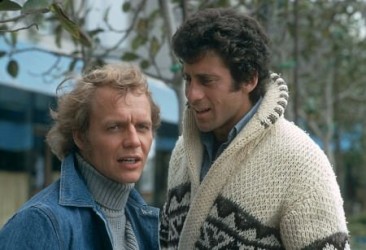
Flashback Episode: Normally the last refuge of a scoundrel, or ultra-traditional sitcoms like Family Ties and The Cosby Show, the flashback episode is, unlike the stress and strife of the usual set, little more than a working vacation. Maybe five minutes of actual screen time, with the rest nicely shoehorned in straight from the archives. Add a dissolve if you’re feeling uninhibited. Now, I’m not one to begrudge hardworking actors for a respite now and again, but isn’t that why they have a summer hiatus? Here, Hutch has been hospitalized with a severe concussion and the obligatory amnesia after Starsky’s reckless driving got the pair into a predictable pickle.
Suddenly, Hutch has been turned into a stranger, and a prickly asshole to boot. Trying desperately to recapture their salad days and cure the amnesia Starsky tells stories, all of which are scenes from prior episodes, proving that Starsys’s fanatical recall is second only to an autistic savant. I mean, we see the scene unfold, but is all this actually being described by Starsky as he sits bedside? It’s the inherent silliness of the flashback, as if we had to get even sillier after insisting on so shopworn a device as the touch-and-go amnesiac. As a further insult, Hutch later reveals that he’s been faking it the entire time in order to teach Starsky a lesson about his dangerous driving habits. You pretended to have lost your mind forever? The show should have ended right then and there, with Starsky emptying his sidearm into Hutch’s head.
Gambling: If I based a theory of life on this show alone  other than believing that all women were either dead, whores, or dead whores I’d say that the greatest American pastime is gambling. We’ll do anything to feel that rush, whether it’s blowing our cop husband’s life savings on a few hands of backroom poker, or saddling up for a ride on an 18-wheeler for a bit of craps. Hell, we’ll even do the unprecedented and fix a boxing match. Not even our heroes are immune, and it damn nearly costs Hutch his life. It’s no accident that one of the show’s few two-part episodes was set in Las Vegas. Countless characters are in debt to loan sharks, at risk of losing their homes, and often resorting to crime in order to feed their addictions. Leave it to Starsky & Hutch to strip away the glamour of the high life.
Heroin: In a nod to The French Connection II, released around the same time as the shows first season, Hutch gets hooked on Horse. Only he’s no sad sack addict. He’s been betrayed by the hand of another, more sinister force: a spurned gangster looking for revenge. Typically, Hutches lust for forbidden pussy (he bedded no fewer than three women who were involved in some sort of criminal enterprise) landed him on a kingpins shit list, the sort of sumbitch who can’t just kill a guy  he has to string him up, string him out, and watch with mirth as that same sumbitch ends up in an alley, confused for a garden variety junkie. Thankfully, Hutch is rescued in time, nursed back to health in a recovery scene so penetrating it makes Jack Lemons’s romp through the greenhouse in Days of Wine and Roses look like naptime at a nursery. Here’s a tip, though, just in case you too find yourself enslaved to H: grab a blanket, sip some soup, and walk around the room a bit. Repeat all weekend, then consider that shit done beat.
![antoniofargas1_480[1]](http://www.ruthlessreviews.com/wp-content/uploads/2014/07/antoniofargas1_4801-326x250.jpg)
Informant: There’s only one that’s worth a damn: Huggy Bear. As played by Antonio Fargas, he’s the proprietor of LA’s hippest den of iniquity, The Pits, but he’s also the world’s most knowledgeable man. Flash a five, he might recall a face. A ten, and a name comes to mind. A twenty? He’s got a full bio, complete with dental records, blood type, and next of kin. When there’s word on the streets, that word slides into his bar, pulls up a chair, and lays it all on the line so Mr. Bear can pass along every last morsel to his two contacts in the police department. But why does he do it? Why betray his people for a few pieces of silver? Above all, he’s a survivor. In the early episodes, he’s both hustler and entrepreneur, selling pet rocks, information, and even a little pussy when money is tight. He seems to go legit as the series wears on, and Starsky and Hutch appear in his place with more frequency, but the flow of information never stops. Best of all, he can find you a hot, untraceable TV inside of an hour. Something about that long, lanky frame that sets scumbags and criminals at ease, I guess, because there hasn’t been a single case where Huggy Bear hasn’t played a part. And, in a pinch, he’ll help you kick heroin.
Jobs: Sure, we’re in a cop’s world and cops are king, but over the course of four seasons, we see many others just doing their duties; punching time clocks in order to get by. Like nurses, man. Sure, we can all agree that nurses are a top fantasy, but was there a need to feature seventeen of the little ladies? Still, there were at least three times as many doctors on staff. And don’t get me started on “hired muscle.” After drug pusher, it’s likely the most popular pursuit for those not going on to college. All told, though, we see more working-class folks than any of the elites: janitors, fencers, cab drivers, massage parlor receptionists, and yes, even waitresses and bartenders. There are also lawyers, judges, and bureaucrats about, and one thing holds true: all federal agents are inflexible assholes, while all competence is local. The cop on the beat can save the day, but whenever a D.C. man steps into town, we know it’s only a matter of time before he’s either shot, kidnapped, or brought up on charges. On a positive note, we see a whole lotta musicians hanging around, including Hutch during his spare time. Voice of an angel, that one, but he can also pick a mean guitar.
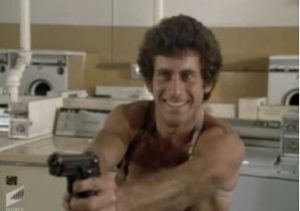
Killings: Let’s get to the final tally, my friends. While on duty, Starsky shot and killed nine people. At least twelve others were badly injured and likely died, but no one followed up at the hospital. Hutch, meanwhile, ended the lives of seven human beings, while seriously injuring six more. Impressive, yes, but not overly so. What does impress, however, is that neither man was ever suspended, with pay or without, for any of the killings. American justice, baby.
Love: For a cop, it’s damn near impossible to find. For Starsky & Hutch, it can only be found if you’re willing to look for it, hold it for a time, and subsequently lose it inside of an hour. Again and again. And if you fall, fall hard and tap what ass you can, because she’ll soon be dead. Or back to the life. Or exposed as a jewel thief, just in town to look up an old friend. But mainly dead. And if it’s the love of your life, well, she simply must be a prostitute who yanks old musty chains in a seedy massage parlor. Or maybe you’re sent to a high roller’s penthouse suite. In either case, you’ll see Hutch as a way out, which means you’ll get tough with the guy who pays for your luxuries, which also means you’ll end up good and dead where Starsky can find you as Hutch shows up for a date. Cue wailing and gnashing of teeth, with more facial contortions than when he kicked heroin. And of course, he’ll accuse his buddy of never really having accepted the poor girl, and he’ll punch him the fuck out because he can’t hit the one who actually killed her. It’s all so complicated. Just take my advice, gents: don’t even get started. Fuck and fondle and yes, even while technically on the clock, but don’t lose your grip. Dames ain’t worth the trouble.
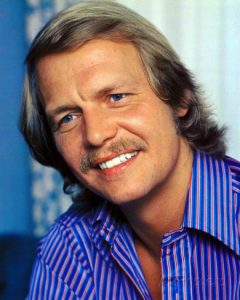
Moustache: For three seasons, David Soul did it all. To make it even more impressive, he did it all clean-shaven. Smooth as a baby’s bottom, and even nicer to smack around. Somehow, though, he was too young; almost deliberately naive. Impossibly handsome and rugged, yes, but hardly the sort of cop you’d expect to send a lot of lead in your general direction. By the final season, all bets were off. Surrendering to the era’s ethic that if anything was worth doing, it was worth doing with a caterpillar on your upper lip, Soul’s decision made us less likely to judge him by his sassy blond cover, and more apt to see the field general within.
The master strategist and logician who just happened to ape a porn star. And while Soul’s Hutch never threatened Burt Reynolds’ supremacy in the facial hair department, he made that moustache his own, challenging all stereotypes to come that men who failed to shave did so because of their affinity for the male persuasion. Almost four decades later, Soul’s moustache still leaves even the barest hint of homosexuality in the dust, pushing aside all talk of the effete to his partner in crime.
Narcotics: Good lord, where do we begin? Los Angeles is filled to the brim with drugs, and this is before crack and meth! I’m not sure a single episode didn’t feature a drug of some kind, and the list is impressive: speed, heroin, Mexican brown heroin, sleeping potions (the date-rape drug of the time), Quaaludes, lithium carbonate, reds, greens, yellows, snappers, cocaine, mushrooms, PCP, highballs, poppers, and at least six dozen nicknames for marijuana. Even caffeine doesn’t get off easy. Now, I’d be the first person to ridicule the Rockefeller laws and all the drug war hath wrought, but we’d be down to a half-season at best if this show couldn’t focus on the illegal narcotics trade. If we can’t hate a kingpin, who we gonna hate?
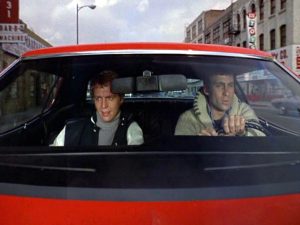
Opening Theme: Perhaps the greatest for any series released since the dawn of television. Fine, a strong second to Angie. And yes, I’m talking about the up-tempo, disco groove of Season Four. The theme was always great, even when the early tones were dark and moody in contrast to the show’s ridiculousness, but for that final march through the streets of Los Angeles? So goddamn infectious that I find myself humming it constantly. Of course, that might have less to do with the music itself than the fact that I’ve watched 80+ episodes of the show in two months. Either way, it never fails to put a smile on my face, even if my obsession with the show is stark proof I’m wasting even more time than usual.
Professors of Pain: Maybe it’s a California thing. Maybe academia had just had it and decided to overthrow the whole damn enterprise. Whatever the reason, college professors were sick fucks in the 1970s. First off, in “A Coffin for Starsky”, you have this grieving chemist at the University named Jennings, who blames the duo for his drug addict son’s death, so he hires the dead kid’s dealer to break into Starsky’s apartment and inject him with that special kind of drug that kills in exactly 24 hours, no more no less. Once Starsky is dead, he’ll do the same to Hutch.
Naturally, it would make much more sense to inject them both at the same time so one couldn’t help the other find the antidote and live, but I did say he’s a lowly chemist, after all, not some genius Sociology professor or something. Next, in “Class in Crime”, an arrogant, elitist, know-it-all professor (a television first) doubles as a hitman in order to test his philosophical (read: Libertarian) belief that, well, some people just deserve to die. Of course, because he has tenure, he cannot be fired even after the murders are revealed. Perhaps the only TV show in history to feature both a homicidal teacher and a mime in the same episode.
Quinn Cummings: Known primarily, okay solely, for her Oscar-nominated turn in the now unwatchable The Goodbye Girl, Ms. Cummings, then but a child, once roamed the set of Season 3’s “The Action”, which considered the all-too-frequent problem of black-market gambling in our nation’s health clubs. Only this outfit played nice and cool. Rather than risk a raid, they took the gambling to the streets; setting up a full-scale casino inside of a moving semi-truck. And yes, the truck must remain in motion, kind of like those casinos that have to be in a body of water, even if it’s just some drainage ditch. Honestly, though, I can’t remember Ms. Cummings’ role here, and pretty much included her to satisfy the “Q” requirement. More memorable is John Carradine, who appears half-naked on a massage table, spouting wisdom about the bad guys. Given the randomness and absurdity, it might have been more fitting had he been played by Orson Welles.
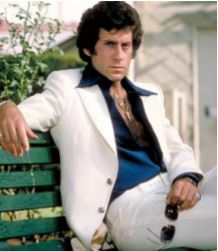
Rider: As in “Contract Rider.” Every big star has one, whether it’s the number of green M&M’s expected at a concert appearance, or the specific vintage of wine demanded in the hotel room after a long day. For Paul Michael Glaser, that rider begins and ends with script approval. Or rather, mandatory inclusions in said scripts for the duration of the series. You see, Mr. Glaser was vain. Extremely vain. And a little jealous. He knew David Soul had him in the looks department (and the blond fucker could sing!) so he had to stir the pot a little. Create some controversy for the papers. In every episode, sometimes several times per scene, Mr. Glaser MUST be told how unbelievably handsome he is.
A hot chick, or any chick, as this expectation included the fat, dumpy girl in the disco killer episode, must give him the once over, flash a coy smile, threaten to lick her lips, and release the ultimate compliment. It’s even better when said compliment is given right in front of Hutch. Starsky always played it off with some aw-shucks embarrassment, but we all knew the line served its purpose. Head swelled and ego massaged, Mr. Glaser could go back to his delusion that the world wanted to see him naked. I mean, the guy knew how to leave just enough buttons undone for maximum chest hair exposure, but it always smacked of effort. He’d never match Soul’s effortless abandon.
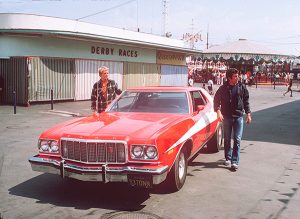
Striped Tomato: So, you have a 1974 Ford Gran Torino. Tomato red (natch), with, you guessed it, a distinctive white stripe. It’s arguably the only car of its kind in the entire city. Maybe the world. And if you’re David Starsky, it means more to you than life itself. You know its every move, and there isn’t a curve that it can’t handle. You’ve kissed black women in that thing, for crying out loud. No wait, you had to switch cars that episode, and that’s why Hutch got shot. Still, it’s like a son to you.
Unique doesn’t even begin to cover it. So, when you’re working undercover, it stands to reason that you’d take the best-known set of wheels anywhere to track suspects, perform sneak attacks, and hide in plain sight. You’re also the only pair of cops working the beat. Shots fired, you’re there. Silent alarm? We’ll handle it. And when it’s time to put on a different shirt and use an exotic accent in order to trap a kingpin, you’ll STILL show up in the sort of car I can see from fifteen miles away. And having seen it before. Oh yeah, and please park it right in front of Huggy Bear’s place. No one will ever wonder why two cops keep visiting a well-known pimp and numbers runner. Must be the beer on tap.
Terminal Cancer: The Big C means different things to different people, but for the beautiful subject of “Cover Girl”, it means hiring an assassin to rub your ass out before the suffering begins. It’s a bold move, but not even she could foresee how bold: once you set that shit in motion, there’s no way to stop it. Even when you say the killer can keep the money. I mean, who knew that terminal didn’t really mean terminal, and that there was such a thing as “permanent remission.” She’s cured! Only she told a guy to hire a guy to kill her when she least expects it. What’s he gonna do? He’s just a middleman. And in this world, a world where killers don’t use guns or knives or simple measures, but rather elaborate bombs and such to take out their victims, death could come from a rigged light bulb, or a baby carriage saddled with enough explosives to decimate a city block. Kill my goldfish, she says. Grenade launcher or Minuteman Missile, he counters. Overkilling is his business and business is good, and for a mere $5,000, he’ll put in enough man-hours for sixteen murders. All while dressed like he’s going to the opera.
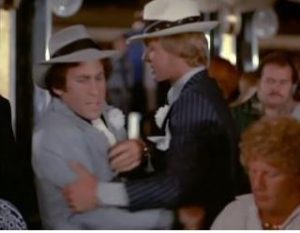
Undercover: If Starsky & Hutch were anything, they were masters of the undercover. I mean, they rarely came up for air. This gave the show’s writers the opportunity to concoct any number of goofy accents, outfits, and locales, of course, but it also played right into the theme that to be a cop is to be tragically insecure. As such, you always want to be elsewhere. Anyone but yourself. The mirror’s for primping, but damn any real reflection. Still, it’s an impressive list: Texas heroin dealers, out-of-town high rollers, cruise ship entertainment directors (Hack and Zack!), sultry dance instructors, unhinged mental patients, good ol’ boy dance students, paramedics, disco godfathers, beauty salon proprietors, street performers, fashion gurus, and the occasional hitman. Despite their blue-collar backgrounds, and nary a lick of training at the Actor’s Studio, Starsky & Hutch played their roles with professionalism, subtlety, and a master’s touch. Improv has never been so effortless. But they really blew it at the health spa casino. A rare misstep for our Olivier and Brando.
Vampire: Yes, dear readers, Starsky & Hutch actually featured an episode with a vampire. Shockingly called “The Vampire,” the plot concerns a series of dancers found dead with puncture marks in their necks. Needless to say, the perpetrator is a crippled ballet teacher. First aired around Halloween 1976, the entry is as bad as it sounds, which means it’s just shy of fucking awesome. Look for Suzanne Somers in her first of three appearances, though she’s only onscreen for a few minutes. I’d say more, but what good would it do? Just say, “You had me at vampire” and move on.
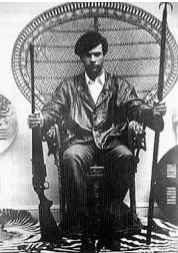
Wicker: Why did we love it so in the Me Decade? More to the point, why did we lust for those high-back wicker chairs made popular by Black Panther Huey Newton? I mean, they were everywhere. Starsky had one. Hutch had one. Even the ambitious photographer with a six-foot-by-ten-foot picture of Robert Redford on her wall had one. No one actually sat in the fuckers, as far as I could tell, but they filled every room with a unique jungle flair. They’re more akin to torture devices, of course, and decidedly uncomfortable (what if I wanted to lean back?), but do you want to be the one human being on earth not to own one? Come to think of it, though, they’re bordering on the tragically ostentatious. And can you really afford one on a cop’s salary? Didn’t think so. I’m blaming Huggy Bear.
Xenophobia: While red-blooded Americans don’t exactly come up smelling like roses, it is an iron rule of the show that if your English is a little funky, you’re a killer. Accent a little unfamiliar? Rapist. Not from around these parts? Collector of female torsos and the occasional scalp. Black men are heartless, robotic assassins or teenage cop killers. No middle ground. Either that, or defiantly sassy and just waiting for the first reasonable white boy to come along and make a pass. Brown? You exploit, threaten, and make money off the suffering of others. And look how the duo is treated when they stop off in a small town for a weekend trip to Captain Dobey’s cabin. Suspicion, hostility, and raised eyebrows, in that order. Sure, the townsfolk were scared of the satanic cult that ruled the area with an iron fist, but still, be a little more accommodating to strangers, for crying out loud.
Yvonne: She appears but once, her long, complex life reduced to a single, unfortunate act. She enters, rips forth with a voice only a glass-gargling princess could love, and exits, with only the promise of a prison term to hold her together. She’s also been called Gertrude, but that wouldn’t help me finish this damn review. Closing in, we see her clearly. It is Anne Ramsey, a stupefying Oscar nominee for Throw Momma from the Train, but also the last woman we’d ever want spying on us as we undress. But she’s a sick lady. Even stoops to describing her neighbor’s naked body. He has a scar, you know. She makes a convincing case for innocence, or at least pure ignorance of the law, but she must be charged. Voyeurism, lady, now head to booking. We hardly knew ye.
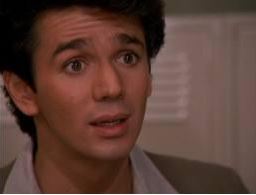
Zmed, Adrian: Before Romano, there was Decker. Marty Decker, thank you very much, with an even more unflappable pompadour to boot. Before his shirtless run on Shatner’s cop show, Zmed was a pickpocketing disco godfather, using his skills and charms to make everyone within earshot of Hollywood regret that Travolta fella in Saturday Night Fever. Here, the discotheque is Fever, and Marty has it in spades, infecting every last contorting broad not stacked in a serial killer’s basement like so much cord wood with a sweat-inducing disease known only as getting down. He never met a shirt button he really liked, so he said goodbye to them altogether, and even when he’s hauled in for a series of murders he did not commit, he’s cool as all get out, until he realizes he has the real killer’s signature piece of jewelry right in his own pocket.
Despite the damning evidence, we all know it isn’t him. Decker is young, vibrant, confident, and limber, with way too much to live for. No, the actual assassin is the old dude, the sore thumb motherfucker in F. Murray Abraham mode. Only a guy who’s had life pass him by would find it necessary to rape and kill every female who wouldn’t dance with him. Decker’s just on the cusp. He and greatness will be meeting shortly. (***Note: because I am best Twitter buds with Mr. Zmed himself, I recently learned that this little cameo led directly to the T.J. Hooker part.)
Leave a Reply